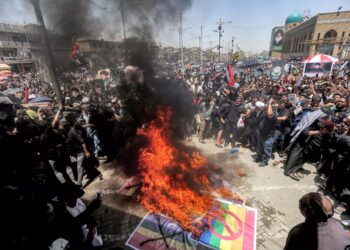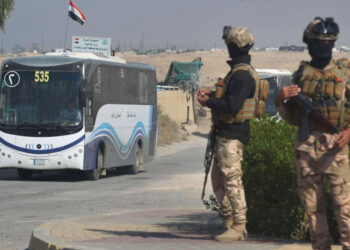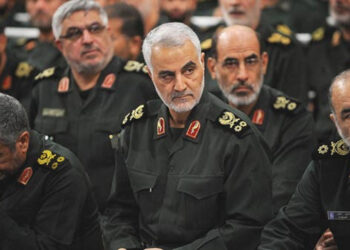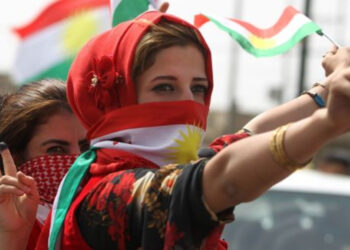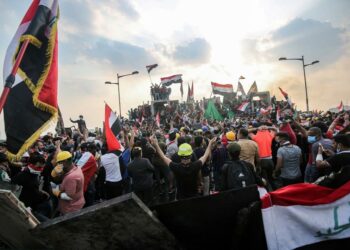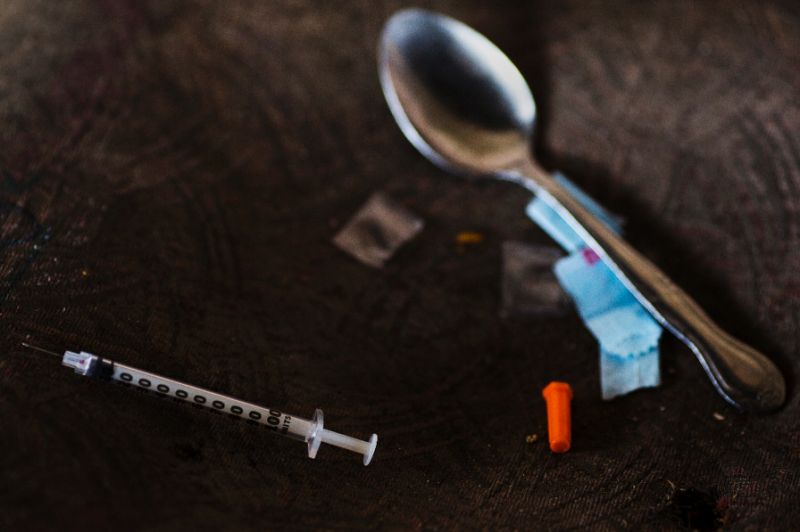Yezidis, a religious minority group, have been persecuted for centuries in Iraq and more recently have experienced genocide at the hands of Islamic State. They’ve been under siege since brutal attacks by ISIS on August 3, 2014, when nearly 10,000 were killed or kidnapped over the stretch of a few days on Mount Sinjar.
Although ISIS has left the area, more than 3,000 Yezidi women and girls out of 6,000 kidnapped are still unaccounted for. Their persecution overall is ongoing, and there is much debate over whether or not Yezidis should return to areas where they were persecuted.
Last week, during an event at the Hudson Institute in Washington, D.C., Executive Director Pari Ibrahim of the Free Yezidi Foundation said, “If there’s no justice, Yezidis will get revenge… I’ll tell you right now: Yezidis will commit murders. Because, if they have to live with the people who raped their daughters, who killed their fathers, who got away with these crimes, yes, justice is absolutely essential.”
Ibrahim’s foundation, an organization based in the Netherlands, works in Iraq and does advocacy work around the world for the religious minority group. She sat down with The Globe Post to discuss the subject further.
Q: What is the main goal with your foundation and what steps have you taken while you’re in Washington, D.C. to educate the public?
Ibrahim: So we started in August 2014 after the ISIS attacks against the Yezidi people. Our first goal was to raise awareness about the situation. (Our goal is) to get as much help as we can for the community suffering on the top of Mount Sinjar and those who were captured by ISIS. Also, recognition of genocide.
We realized the needs of our people were immense, so we grew into an organization that provides psychological assistance, builds cases against ISIS perpetrators and mainly provides advocacy for the Yezidi genocide.
Also, we create more awareness among governments on how the Yezidis live and what the future of the Yezidis looks like. It’s very difficult for the Yezidis to live in a place where they basically do not have religious freedom. We are an ethnic religious minority that lives in Northern Iraq and have been persecuted for many, many years because of our religion.
Being in Washington we’ve been going to ministerials and events raising awareness of the plight of our people, including (that) 3,000 Yezidis (are) still missing.
Q: Since you’ve been in Washington and since it has been classified as genocide, have you seen any commitments to taking steps, or taking any real action to help the Yezidis?
Ibrahim: I think overall, you can say no, because it’s been nothing for a few years. In the last two weeks, we were invited to this ministerial event from the International Religious Freedom office of the State Department (Ministerial to Advance Religious Freedom). A lot of promises have been made to look after the Yezidis.
I do have the feeling that (the) State Department will look after minorities like the Yezidis much more, because, as I said before, they don’t really have religious freedom in the country, in Iraq, in Kurdistan. I do hope the U.S. government will take the necessary steps.
We know that in Germany, a province in Baden Wuttenberg has taken in 1100 Yezidi survivors. Canada, they promised to take in Yezidis and took in much less than hoped. Australia has a program to bring in Yezidis. But not much more has been done. We’re talking about over 400,000 Yezidis displaced.
Q: Are they mostly internally displaced?
Ibrahim: Yes. Since the genocide, they are trying to get (out of Iraq) towards Europe, or any other country.
Q: Have you had any promises from the State Department, or the U.S. government regarding allowing in refugees, or a specific amount of refugees?
Ibrahim: No. The main idea is that they don’t want Yezidi refugees to come in, but to go back to where they were before. There are a lot of reasons why they can’t go back to where they were before. ISIS was there, they are not there anymore, but there still are a lot of IEDs (improvised explosive devices).
The Yezidis are between the Iraq government and the Kurdish government. It is politically influenced. Any Yezidi that would want to go back to Sinjar has to pick a side. Yezidis being in the middle of that is not good. Besides that, Yezidis cannot go back because they have no trust in the(ir) security anymore.
This is a big issue, one of the bigger ones, because they feel they cannot trust anyone after what happened to them after they were abandoned by the Kurdish forces. People don’t trust the security forces in Iraq anymore, in Kurdistan anymore. Going back to Sinjar without having answered that question? No, Yezidis won’t go back.
Q: Originally, Kurdish forces promised to protect the Yezidis. Have there been anymore promises? It has been four years now.
Ibrahim: The area of Shingal is now under control by the Iraqi Popular Mobilization Units. It is not in the hands of the Kurdish government. As I said before, the Yezidis feel just trapped in the middle of all of it. They want the protection of the USA. They want the USA to bring boots on the ground and protect Yezidis. This is something the USA will probably not do. This is why the Yezidis are not going back.
Promises are made constantly, by everyone. They talk, they make promises – things they will do – things they want to do – but it’s hardly a reality. We’re four years further, Yezidis cannot go back to where they come from. Our mass graves are still there. IEDs are still there. There is now a demining process going on, but it just started. There’s so many things that, for the Kurdish government and the Iraqi government, Yezidis are the last things on their agenda; if they are on the agenda at all.
So what trust should we have in governments that have laws that (negatively) affect minorities, and religious minorities, like the Yezidis or the Christians? No political voice and no protection leads to Yezidis that want to go out of Iraq and not come back.
Q: Is there a specific place they’re seeking? Are they seeking a special economic zone outside of Iraq or even within Iraq? Is that an option?
Ibrahim: For the Yezidis?
Q: For the Yezidis.
Ibrahim: Well, Yezidis have never had any economic opportunity or protection. So when this happened on the third of August, the Kurdish Peshmerga withdrew and left Yezidis. That is why there is no trust. There needs to be a lot of effort to ever build that trust.
First of all, there should be efforts to seek the truth. What happened that day? What happened those days? What did ISIS do? What did the governments do? Why were the Yezidis, for more than three days, stuck on Mount Sinjar with no food or no water and it had to be America to come in and interfere (with ISIS)?
So there are a lot of questions that need to be answered, and they only need to be answered with the truth. One example is with the Dutch in Srebrenica. The Dutch withdrew, with no fighting, and there was a massacre. The same happened with Sinjar. There needs to be truth about what happened.
Also, when we are talking about justice, a lot of the perpetrators are just walking around, or they are in jail. They are indicted for terrorism. Terrorism and human rights are not the same. To this day, no ISIS member has been indicted for crimes committed against Yezidis. So, how can you ask Yezidis to go back to Sinjar if the neighbors that pointed out ‘this house is a Yezidi’ or the neighbor that raped their daughters, how can Yezidis live in harmony with those people? If there’s no justice – there’s no reconciliation.
Q: Is there any local court being implemented? In the Democratic Republic of the Congo, there are local magistrates and local courts being formed, basically by the communities, to punish crimes. Have you seen that at all in Iraq?
Ibrahim: In Iraq, sometimes convicted ISIS members are being shot in the head. In Kurdistan, there is a moratorium on the death penalty. (ISIS) members are just in jail. The Free Yezidi Foundation has, with the Office of the SRSG on sexual violence, talked with the U.N. We’ve had many talks. We want to do test cases (of trials) on a local level. We have tried to talk with the government and the Kurdish government about this. Everything takes so long. It costs a lot of time, money and effort to (make) this into a realization. (But) we are in the process of this.
Q: Last week, spokeswoman Heather Nauert from the State Department made great claims about Secretary Pompeo, Vice President Mike Pence and others who held this religious freedom conference. They made great promises they would protect religious freedom around the world. Do you have any promises from the State Department, and if not, what would you ask spokeswoman Heather Nauert?
Ibrahim: Well, I was at the ministerial also. I heard these promises also. I do believe they are now much more aware of the things happening around the world against the religious minorities. I definitely think the U.S. will (help). They’re now doing a big religious freedom fund. They gave another 17 million for the demining in Ninevah. These are all things that will happen. I do believe the U.S. government is going to help Yezidi organizations, Christian organizations to get their voices heard. They are trying. They are now bringing out reports that basically say what minorities are facing on a day-to-day basis. I think that that is very important. That is already a huge step toward more freedom.
Q: The Yezidis have gotten through dozens of genocides in their long history. How are Yezidis faring right now? How are they living day-to-day; getting food, water, shelter and medical care?
Ibrahim: We say this is the seventy-fourth genocide. We never were public about attacks against Yezidis because we never had a way to be public about it. Now that there are more Yezidis scattered around the world, the news about this genocide is being spread much more than any (genocide) before. Family members sending photos via smartphones helped a lot to show it. I think this is the moment for governments to make sure that there will never ever be an attack on Yezidis again. Now that everyone knows, that governments know, there should never be an attack again.
The Yezidi situation, after four years-my people are still in IDP (Internally Displaced Peoples) camps. My people are still fleeing the country. There’s no way for them to go back. Those who go back sometimes end up returning to IDP camps. IDP camps are overflowing. People are living in unfinished buildings (and) makeshift tents. The situation is just very bad. In summer it’s too hot. In winter it’s too cold. Electricity in the camps is not (good). The tents are bursting into flames in some cases because of the bad electricity. There’s a lot of suicide happening in the camps. Yezidis do not see any future in Iraq, at the moment.
Q: What are three things that the Free Yezidi Foundation is seeking on your agenda to get done in the next five years?
Ibrahim: Well, one thing is that we really want justice. That’s really important for us. We really want to make sure that Yezidis have a voice in Iraq. We do try to and tell governments that Yezidis do not have a good situation back at home. They have nowhere to go.
We could wait ten years more and hope that the Yezidis can go back to Sinjar, but that’s not the case. Yezidis should be accepted as refugees from a genocide and they should be granted asylum when they come to countries. They should be granted protection because it is not over.
The Yezidis will be targeted again, and that is because of lack of support from governments to Yezidis. I’m talking about the Iraqi government, I’m talking about the Kurdish government. There needs to be so much more done to stop hatred, hate speech, from religious leaders in Iraq, in Kurdistan against the religious groups like Yezidis or Christians. Without these (protections), these things will happen over and over again.
Q: In an event last week you said the Yezidis will seek justice and go back willing to do anything it takes to do so. Do you stand by that? Do you think that will happen?
Ibrahim: If there is justice, then reconciliation can start. But also even reconciliation will take many, many years. We are talking about a people who suffered a genocide and don’t trust anyone anymore. It’s not as easy as governments might think. They might think ‘Oh we’ll just send the Yezidis back to Sinjar.’ That’s not the case! It’s very difficult for the Yezidis to stay in the camps. And yet, they’ve been staying in the camps for four years. Some people went back to Sinjar, but not everyone went back because people don’t want to suffer this again. If perpetrators roam free, there may be acts of revenge by Yezidis. That is another reason why real justice is important.
Q: What economic or just life-giving capacity did the Yezidis have before August 3, 2014, compared to now?
Ibrahim: The Yezidis have always been oppressed! In any way. There’s always inequality, every time. If there’s a job interview with a Yezidi, a Muslim and a Christian, the Yezidi will be the last to be considered. There is so much inequality. There is so much unfairness. There is unfair treatment of Yezidis that governments don’t speak about. The Iraqi government or Kurdish government, they don’t deal with these things that happen on a day-to-day basis and this affects our community.
How can people have a higher education when chances are not given to them? Why are chances given to a Muslim Kurdish kids coming to America to study abroad, why aren’t they given to the Yezidi community for higher education opportunities, and not to Yezidis? Why not see Yezidi students study in America at a university? Why don’t Yezidis have high-level jobs? You don’t see the Yezidis in parliament. It’s a disgrace! But this is how Iraqi Yezidi people treated.
Q: How many Yezidi people are in Iraq or Kurdistan?
Ibrahim: Around the world, there are a bit over a million. Genocide has made sure a lot of the Yezidis in Iraq got killed, but there were over more than 500,000 Yezidis in Iraq before.
Q: Does that account for a forced renunciation of Yezidi faith?
Ibrahim: No.
Q: Right now, what is the cry of the Yezidi, if you had to say one statement?
Ibrahim: They want to go out. They want to leave Iraq.
Q: Leave Iraq?
Ibrahim: They want to leave Iraq. They want to leave Kurdistan. They want to live a new life and a new future elsewhere. That is now the situation. I’m going to be honest.
Q: Even to leave Sinjar completely?
Ibrahim: Yeah. The majority of people will say that, and that is what they say to me.
Fate of the Yazidis Remains Unclear Four Years After Genocide



